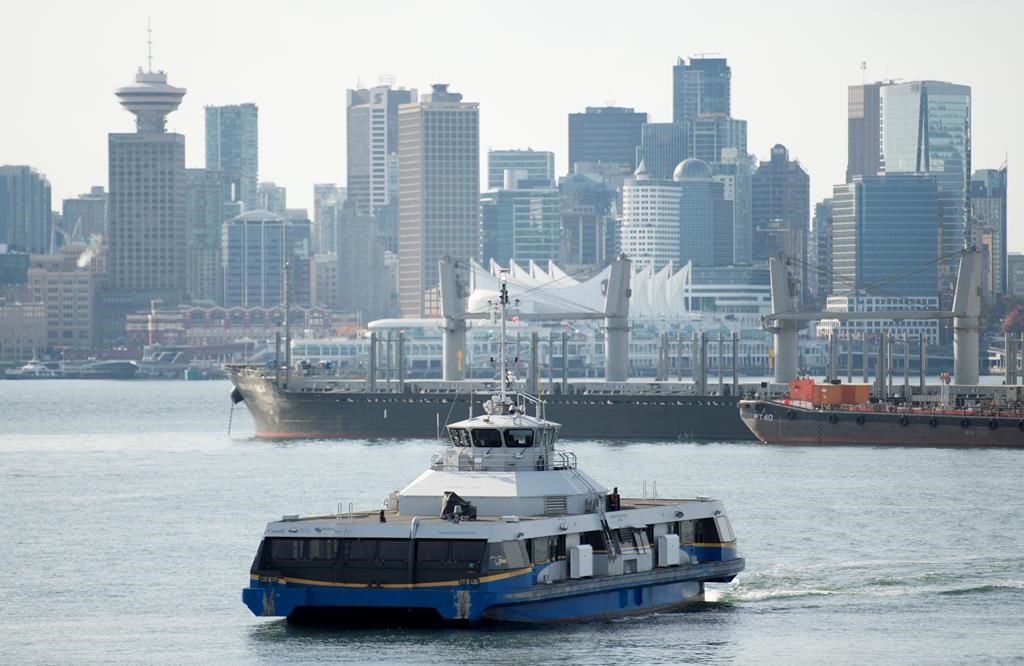A reported overhaul to the SeaBus schedule this week linked to the ongoing Metro Vancouver transit dispute will not go ahead as announced, TransLink said.

The transit authority said Sunday morning that sailings would be reduced to every 30 minutes outside rush hour on Monday and Tuesday as the system grapples with a transit operator overtime ban.

Later on Sunday, however, TransLink said that change would not go ahead after all, saying a staffing shortage had been resolved.\
Instead, four sailing cancellations have been reported for Monday morning:
Lonsdale Quay
- 7:20 a.m.
- 9 a.m.
Waterfront Station
- 7:35 a.m.
- 9:15 a.m.
Outside of those cancellations, sailings will still operate at 15-minute intervals outside the morning and evening rush hours, when sailings will then depart every 10 minutes.
TransLink says a detailed schedule with adjusted departure times will be available on its website and Twitter channel.
The union representing 5,000 bus drivers, SeaBus operators and maintenance workers has been locked in a bitter contract dispute with employer Coast Mountain Bus Company (CMBC), with talks breaking down multiple times since October.

Since job action began on Nov. 1 with maintenance workers refusing overtime, TransLink has been forced to cancel multiple SeaBus sailings per day. CMBC says every sailing needs an engineer on board for when issues arise.
After contract talks broke down again last week, Unifor instructed transit operators to refuse overtime on Friday. That day saw massive disruptions to bus routes throughout the day.
The operator overtime ban is set to take place semi-daily, returning on Monday, Wednesday and Friday.
TransLink is predicting a 10 per cent reduction in bus service due to the latest job action. Drews said it’s difficult to predict exactly what routes will be affected until service begins Monday.
On Friday, the Vancouver and Surrey bus depots saw the highest number of disruptions with multiple routes seeing cancellations.
The two sides remain far apart in contract negotiations, with working conditions and wages remaining the key sticking points.
When talks broke off again on Thursday, CMBC said the wage gap between what employers are offering and what the union wants is about $150 million over 10 years. That’s down from a projected $600-million gap when job action began.

TransLink says transit operators have now been offered a wage increase of $6,000 for drivers and of $10,000 for skilled trades workers over four years at the top end of their salary grids.
The union says that’s not good enough and that transit operators’ pay should be looked at in comparison to Toronto’s transit system, while the pay of trades workers should be looked at in comparison to their counterparts in the SkyTrain system.
TransLink says the latest offer also includes “significant improvements to working conditions such as guaranteed recovery time for operators.”
Unifor locals 2200 and 111 have been without a contract since the end of March.
Drews said no new talks are scheduled between the union and CMBC. TransLink is considered a third party and is not involved in the negotiations.
“What CMBC has been saying is they’d like the union to come back to the table with reasonable wage demands,” she said.
“Ultimately, CMBC would like to reach a deal that the region can afford. TransLink operating budgets are only half supported by fares. The rest comes from taxpayers. So we have to find something that’s fiscally responsible.”
Global News has reached out to Unifor for comment.
- Vancouver Canucks praise loud crowd in opener, hope to hear roaring repeat for Game 2
- Vancouver mother breastfeeding in car attacked by stranger: police
- Better disabled accessibility needed for B.C. taxi, ride-hailing industry, committee says
- Canfor to shutter B.C. sawmill, curtail Prince George pulp mill




Comments